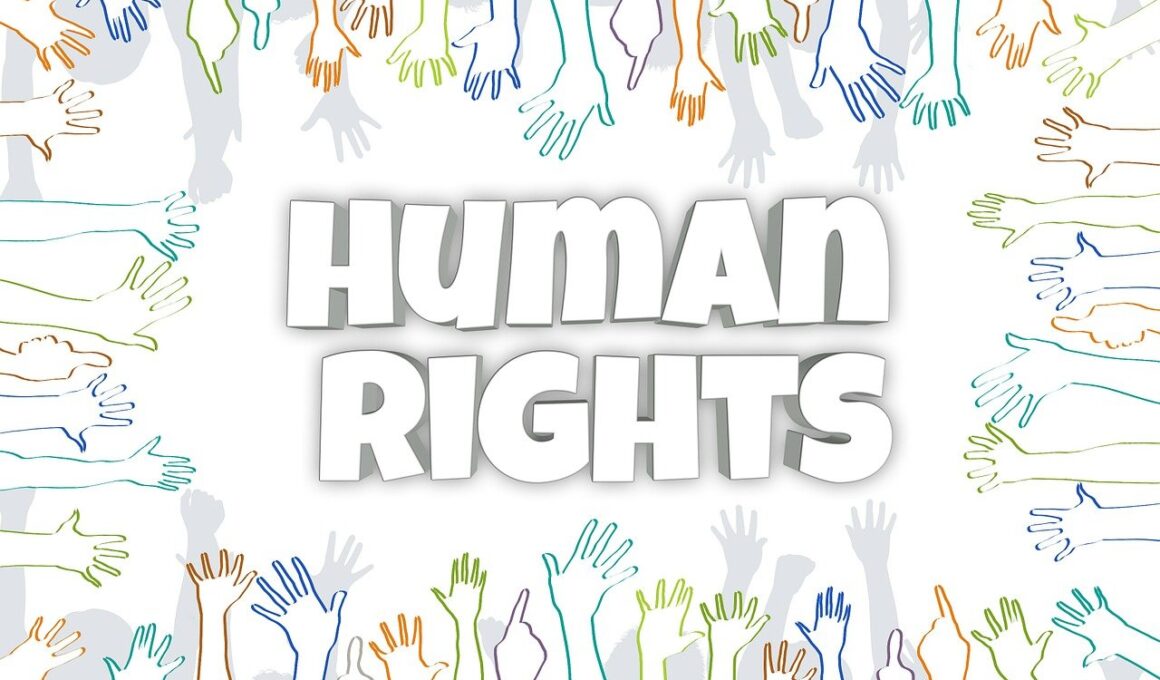Eating Disorders and Anti-Discrimination Laws: Protecting Patients’ Rights
Eating disorders represent a serious mental health issue affecting individuals worldwide. Unfortunately, stigma and discrimination often accompany these disorders, leading to a lack of appropriate support and protection for those affected. Anti-discrimination laws play a crucial role in safeguarding the rights of individuals with eating disorders. Through such laws, patients gain access to necessary healthcare services without facing bias or prejudice. Legislative frameworks that address the unique challenges faced by people with eating disorders can enhance patient outcomes significantly. Patients must be aware of their rights, including the right to equal treatment in healthcare settings. Notably, these rights extend to all aspects of life, including employment and education. Awareness of anti-discrimination laws can empower those suffering from eating disorders to seek help. The more informed individuals are about their rights, the more likely they will challenge discrimination when it occurs. Grounded in the principle of equality, these laws compel healthcare providers to exhibit sensitivity and understanding toward their patients. This is essential for fostering supportive environments for recovery from eating disorders.
As part of the framework protecting patients’ rights, various anti-discrimination provisions exist. For instance, the Americans with Disabilities Act (ADA) is instrumental in defining the scope of protection available to individuals with eating disorders. Under the ADA, it is unlawful to discriminate against those suffering from a mental health condition, including eating disorders like anorexia and bulimia. Consequently, restaurants and employers, for example, need to provide reasonable accommodations to ensure equal access for affected individuals. There is also the Rehabilitation Act, further enhancing protections against discrimination in federally funded programs and services. These legislative measures work together to promote the inclusion of individuals with eating disorders within society. Additionally, education and healthcare providers need to be informed about these laws to ensure compliance. Training programs that cover anti-discrimination laws and their application are essential for reducing stigma and ignorance. Patient advocates also play a crucial role in promoting awareness of patients’ rights under these laws. They ensure that rights are recognized and upheld, providing a necessary bridge between patients and institutions.
Impact of Discrimination on Patients
Discrimination against patients with eating disorders often leads to a multitude of adverse effects. Individuals may experience feelings of shame, confusion, and frustration when their ailments are dismissed or misunderstood. This can exacerbate their conditions and hinder recovery efforts significantly. Moreover, discriminatory practices can discourage individuals from seeking help, perpetuating a cycle of isolation and worsening health. The negative effects of discrimination underscore the necessity for effective legislative protections. By enforcing anti-discrimination measures, those in charge can counter this societal stigma. Not only does effective legislation provide legal recourse, but it can also foster societal change regarding attitudes toward eating disorders. Educational initiatives aimed at promoting awareness and understanding can help shift public perception, leading to a more supportive environment for recovery. Comprehensive support systems must be implemented to address both the health and emotional needs of patients. This involves interdisciplinary approaches that not only focus on medical treatment but also encompass psychological and social support. Legislative frameworks can facilitate the cooperation between various stakeholders, including healthcare providers and community organizations.
Nevertheless, legal challenges persist within the realm of eating disorder treatment. For instance, patients may face difficulties in accessing appropriate care due to insurance limitations or coverage exclusions. In some cases, providers may also remain unaware of their obligations under anti-discrimination laws, leading to inconsistencies in patient care. As a result, it becomes essential to educate both patients and providers about existing rights and responsibilities. Awareness campaigns can significantly increase understanding and compliance with anti-discrimination laws. Collaboration with advocacy organizations to disseminate relevant materials can create a broader impact. Patients should have easy access to information regarding what constitutes discrimination and who to contact if they encounter it. Strengthened legal protections can only make a difference if patients know how to exercise their rights effectively. Therefore, it is integral that educational resources are readily available and easily understandable. Patients’ feedback can drive improvements in compliance efforts and increase accountability for healthcare providers. Ensuring that individuals can navigate their rights effectively contributes to fostering a culture of empathy and support.
Role of Advocacy Groups
Advocacy groups serve as essential allies in the fight against discrimination faced by individuals with eating disorders. These organizations not only raise awareness about anti-discrimination laws but also provide vital support networks for affected individuals. By offering resources and legal guidance, they empower patients to assert their rights effectively. Additionally, advocacy groups work towards enacting further legislative changes to strengthen protections for those affected by eating disorders. By engaging directly with policymakers, these organizations can ensure that the voices of individuals with eating disorders are heard in discussions around legislation. Furthermore, advocacy efforts often involve educational outreach initiatives aimed at both healthcare providers and the general public. These educational campaigns work to demystify eating disorders and address common misconceptions. Increased awareness leads to greater understanding and can alter the negative perceptions surrounding eating disorders. Moreover, advocacy organizations often facilitate partnerships between community members, healthcare systems, and educational institutions to improve overall support. This collaborative approach is vital in creating safer environments for affected individuals. By emphasizing the importance of anti-discrimination laws, advocacy groups help to shape a stronger foundation for patient rights.
Additionally, the psychological impact of anti-discrimination laws cannot be understated. They instill a sense of empowerment among individuals battling eating disorders. When people know their rights, it fosters a sense of agency and encourages them to engage with healthcare systems positively. An understanding of anti-discrimination laws can motivate individuals to pursue various avenues of support and assistance. It creates an environment where they are not only allowed to seek help but are actively encouraged to do so without fear of bias. Further, legislative support can lead to better mental health resources being made available, reducing barriers to treatment. Community-based programs designed to educate and promote understanding of these laws can foster healthier dialogues around eating disorders. When society empathizes with those struggling, it cultivates a culture of healing and acceptance. Moreover, supportive policies encourage collaboration between families, professionals, and patients themselves. With open access to resources and comprehensive healthcare, treatment which respects patients’ rights becomes attainable. This collaborative effort ultimately leads to enhanced outcomes for individuals dealing with eating disorders.
Conclusion: Envisioning a Supportive Future
In conclusion, the intersection of eating disorders and anti-discrimination laws is paramount for protecting patients’ rights. Legislative measures can foster an inclusive society where individuals with eating disorders receive the support they need to recover. It is essential that public consciousness evolves to recognize and respect these rights. Continued advocacy and education remain crucial to achieving this goal. By supporting individuals, stakeholders can create a safe environment conducive to recovery. Enhanced awareness and understanding must permeate all sectors of society, including healthcare, education, and employment. As these laws evolve, they must adapt to address emerging challenges associated with eating disorders. This dynamic legal landscape necessitates ongoing conversations about patient rights and discrimination. Restoration of mental health and well-being requires robust protections that patients can reliably access. Ultimately, the responsibility lies with everyone to foster solutions that empower individuals suffering from eating disorders. By promoting anti-discrimination laws, we contribute to breaking down barriers while reinforcing essential support systems. Together, we can envision a future where all individuals facing eating disorders are granted dignity and respect.


